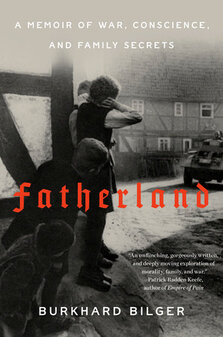|
9/25/2023 0 Comments Burkhard Bilger's "Fatherland" This past April, I had just returned from a whirlwind (one week) trip to Switzerland and Germany with my brother and 89 year old mother when I learned the Burkhard Bilger had published a memoir, "Fatherland: A Memoir of War, Conscience, and Family Secrets." To say I was excited would be an understatement. Bilger's 2016 article in the New Yorker, "Where Germans Make Peace with Their Dead" rocked my world. I still remember precisely where I was -- in a hotel room in Poland (my maiden trip), overlooking the old Rathaus in the stare miasto (old town) -- when my daughter texted me, "Mom! You need to read this New Yorker article!" It gave a name to my weird German-American experience and set me on a journey of discovery that is ongoing to this day. And with "Fatherland," Bilger's timing once more was impeccable. My recently-completed trip happened to have taken me through the Black Forest region, a few kilometers from Herzogenweiler and wended westward to the small Badische city near the Rhine that is my Swiss grandfather's family's "Stamm Ort" or place of origin -- a place neither I nor my mother had ever visited, but which my brother was eager to show us. Whereas my genealogical curiosity tends to dwell on social history and speculating on family relationships, my ex-military brother has specialized in our family's military service history, and in this region and across the river into Alsace, France, he had done a deep dive into the WWI service of our grandfather, great grandfather, and various great grand uncles. As it happens, the first few chapters of Fatherland delve vividly into Bilger's grandfather's WWI service. His descriptions of deciphering Sütterlin military records from the Karlsruhe archives, of taking in the scope of and impact of that somewhat forgotten war (at least to Americans), felt deeply familiar. Again, the parallels were uncanny. So when I dove into Fatherland, it was with a profound sense of recognition. I could picture the insular Black Forest communities. I could hear Bilger's Alemannish, because it is so similar to my mother's St. Galler Schwiizerdütsch, a dialect that I understand but don't speak, which sounds like home. I had expected to connect to the book based on the German/paternal side of my story, his wrestling to make sense of a man and an identity when few clues remained, but for it to also, unexpectedly, connect with my maternal Swiss / German / Baden / Schwaben side just made it all the more special. Needless to say, I drank in the book. And the prose: Just. Gorgeous. It made part of me think, "Well, you might as well hang it up. There is no way anything you ever write is going to be even close to this good." Then, a small pang of jealousy. Would that I could quit my job today and just poke around archives and talk to people and write. Would that my own mother happened to have been a historian and written on World War II and its after effects. (Bilger's mother's thesis research centered on Vichy France.) Would that I could fortuitously stumble upon a municipal archive. Le sigh. But, as my daughter recently said to me, “You can do it too! You have a story! Just start" and I was touched by her support. We were headed to a snug German food hall (natürlich) after attending a book talk in Washington, DC between Bilger and his New Yorker colleague and old friend Atul Gawande, another one of those demi-gods who not only is an accomplished surgeon and public health official, but oh yes, finds time to write acclaimed essays and books on the side. The talk was a pleasure, another chance to feel seen, and more pleasurable still (beyond the later leberkäse sliders), it prompted some good conversation with my daughter about my upbringing and how it had impacted her and our family life. So here’s to more conversation, more connection. Prost. Fatherland, By Burkhard Bilger. Published by Penguin Random House. www.penguinrandomhouse.com/books/241123/fatherland-by-burkhard-bilger/ Sample Reviews
0 Comments
Leave a Reply. |
 RSS Feed
RSS Feed